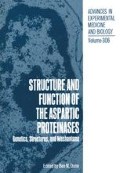Abstract
HIV-1 and HIV-2 proteinases (PR) process the gag and gag-pol precursor polyproteins to produce the mature structural and enzymatic proteins found in infectious virus particles. These aspartic proteinases, from HIV-1 in particular, have been studied intensely since their discovery because they are attractive targets for therapeutic intervention in the treatment of AIDS. Antibodies which specifically recognize these proteinases were critical reagents in many of the experiments investigating the function of these proteinases. Here we describe the characterization of polyclonal and monoclonal antibodies against HIV-1 and HIV-2 PR.
Access this chapter
Tax calculation will be finalised at checkout
Purchases are for personal use only
Preview
Unable to display preview. Download preview PDF.
References
M. C. Graves, J. J. Lim, E. P. Heimer and R. A. Kramer, An 11-kDa form of human immunodeficiency virus protease expressed in Escherichia coli is sufficient for enzymatic activity, Proc. Natl. Acad. Sci. U.S.A. 85: 2449 (1988).
E. Hochuli, W. Bannwarth, H. Döbeli, R. Gentz and D. Stüber, Genetic approach to facilitate purification of recombinant proteins with a novel metal chelate adsorbent, BIO/TECH 6: 1321 (1988).
G. Kohler and C. Milstein, Continuous cultures of fused cells secreting antibody of predefined specificity, Nature (London) 256: 495 (1975).
L. M. Reik, S. L. Maines, D. E. Ryan, W. Levin, S. Bandiera and P. E. Thomas, A simple, non-chromatographic purification procedure for monoclonal antibodies against cytochrome P450 isozymes, J. Immunol. Methods 100: 123 (1987).
S. F. J. LeGrice, R. Zehnle and J. Mous, A single 66-kilodalton polypeptide processed from the human immunodeficiency virus type 2 pol polyprotein in Escherichia coli displays reverse transcriptase activity, J. Virol. 62: 2525 (1988).
A. Wlodawer, M. Miller, M. Jaskólski, B. K. Sathyanarayana, E. Baldwin, I. T. Weber, L. M. Selk, L. Clawson, J. Schneider and S. B. H. Kent, Conserved folding in retroviral proteases: crystal structure of a synthetic HIV-1 protease, Science 245: 616 (1989).
Author information
Authors and Affiliations
Editor information
Editors and Affiliations
Rights and permissions
Copyright information
© 1991 Plenum Press, New York
About this chapter
Cite this chapter
Stoller, T.J., Lim, J.J., Woltizky, B.A., Graves, M.C. (1991). Monoclonal and Polyclonal Antibodies: Reagents for Studying HIV-1 Proteinase Variants. In: Dunn, B.M. (eds) Structure and Function of the Aspartic Proteinases. Advances in Experimental Medicine and Biology, vol 306. Springer, Boston, MA. https://doi.org/10.1007/978-1-4684-6012-4_66
Download citation
DOI: https://doi.org/10.1007/978-1-4684-6012-4_66
Publisher Name: Springer, Boston, MA
Print ISBN: 978-1-4684-6014-8
Online ISBN: 978-1-4684-6012-4
eBook Packages: Springer Book Archive

